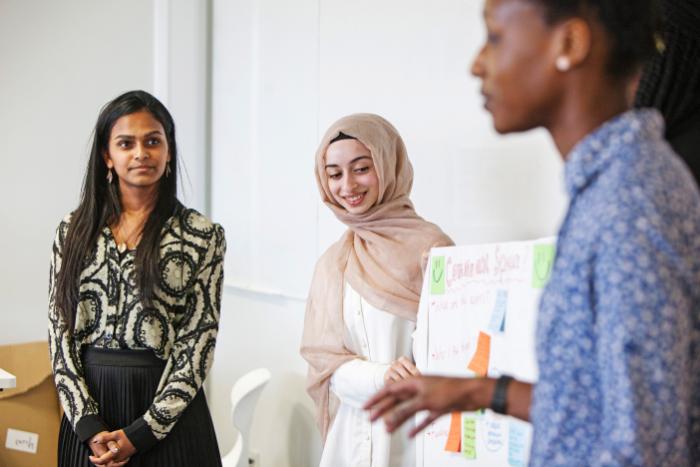-700x467.jpg)
Inclusive curriculum
Discover the principles of our inclusive curriculum framework by expanding the headings below and explore related case studies.
1. Empower
Empower all students to thrive in diverse environments
We aim to develop graduates with a global outlook who will flourish in diverse multilingual communities locally and around the world (and who can make a difference to those communities).
Our graduates should recognise and respect their own, and each other's, individual worth.
We offer our students of all backgrounds, cultures and identities a wide range of critical cultural and intercultural encounters both within programmes and in broader community engagement.
-400x249.jpg)

2. Co-create
Co-create with students to enrich the learning environment
Students and staff work in partnership on curriculum development and/or co-curricular areas to create "a collaborative, reciprocal process through which all participants have the opportunity to contribute equally, although not necessarily in the same ways" (Cook-Sather, Bovill & Felten, 2014, pp. 6–7).
Co-creating involves shared decision-making and commitment, encourages respectful interactions between students and staff and fosters student engagement. We think students can really help staff to think about what an inclusive learning environment looks like.


3. Diversify
Diversify the curriculum and broaden intellectual horizons so that students can see themselves reflected and reach beyond themselves
We encourage students to think about their own experiences and how these intersect with the intellectual material they encounter.
We aim to acknowledge and address structural inequalities by including diverse voices, perspectives and identities so that our curriculum is exciting, challenging and relevant.
Our graduates should be open-minded, confident about engaging with contrary perspectives, and responsive to feedback.


4. Enable
Enable student engagement and success through inclusive pedagogy
Traditionally, when discussing an inclusive curriculum or diversifying the curriculum, there seems to be an emphasis on content; making "what is taught" more diverse and inclusive. Inclusive pedagogy relates to "how we teach", therefore, focusing the inclusion lens onto the teaching approach, regardless of the content.


5. Develop
Develop students' confidence to participate in disciplinary discourse and community
We want our students to be able to engage in, and contribute to, disciplinary conversations and communities.
Language is a critical tool for developing thinking and understanding in the disciplines. Learning a discipline or subject means learning a disciplinary language and ways of thinking supported by it. None of us are native speakers of Science and Engineering language, or any other discipline, even if it is expressed through the medium of languages in which we may or may not be fluent. Therefore, a powerful way of dismantling barriers to academic inclusion is to focus on decoding disciplinary language and making it accessible.
We build students' confidence and enable them to foster connections by including them in disciplinary communities of practice and specialities.


6. Reflect
Reflect on our language to promote an inclusive learning environment
We aim to be welcoming and to communicate with accuracy, care and respect throughout the learning environment. Using appropriate language can help to reduce fear, othering and feelings of exclusion.
We recognise that language is constantly changing and evolving and that sometimes we inadvertently make mistakes or misinterpret what others say to us.

7. Value
Value student feedback
We welcome feedback and engagement from students about their learning experiences. We recognise that "engaged student learning is positively linked with learning gain and achievement" (Healey, Flint & Harrington, 2014: 7).
We encourage students to tell us what they think so that we can reflect on what works and what doesn’t and act together on what we want to improve.

.jpg)
8. Encourage
Encourage all students through inclusive advising and mentoring
Effective and inclusive advising plays a key role in supporting our students with a range of different backgrounds and experiences to succeed. We recognise that not all students come to Queen Mary fully equipped to take on academic study. Inclusive advising can support all students "to attain academic success and achieve desired qualifications" (Smith, 2005: 45).
Peer mentoring fosters a sense of belonging in new students, eases the transition into university and supports student engagement by means of "collective sharing of knowledge through facilitated group discussion" (Spedding, Hawkes & Burgess, 2017: 145).









